In the News–Social Media
“There’s a ‘Fanatical Group of Worshippers’ in Your Stock. What’s Next?”
Lindsay Frost, Agenda, June 28, 2021

AMC Entertainment Holdings CEO Adam Aron has been actively embracing on Twitter, YouTube and other platforms a new trove of investors who propelled the company’s stock price up more than 300% in the past month. The latest Reddit-driven phenomenon has companies reconsidering how to communicate with these investors and encourage them to stick around — especially for those companies that could use the investment to pay off debt and invest in innovations.
The so-called meme stock frenzy, which has led to a deluge of retail investors pouring into AMC, GameStop, Clover Health and the GEO Group, is a hotly debated topic on Wall Street, but for boards overseeing companies that suddenly have an influx of retail investors, sources say it’s important to nail down the right messaging, consider incentivizing these investors and use the cash wisely.
“This brave new world of all of these Internet platforms and every person having their own voice has the power to whipsaw pretty much everything we thought we knew, and that extends to the fundamental value of stock,” says Davia Temin, president and CEO of risk consulting firm Temin & Co. “The wise board, and certainly the wise company, has to understand what is going on and figure out the way to communicate to all parties in a way that engenders trust.” […read more]
Franklin Fires Staffer the Day After Park Video Goes Viral
Annie Massa, Bloomberg, May 26, 2020
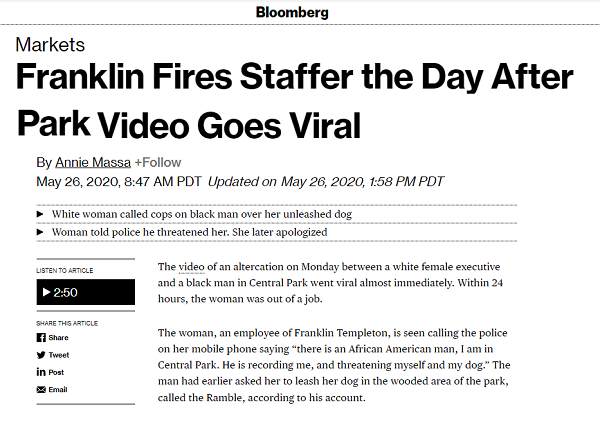
The video of an altercation on Monday between a white female executive and a black man in Central Park went viral almost immediately. Within 24 hours, the woman was out of a job.
The woman, an employee of Franklin Templeton, is seen calling the police on her mobile phone saying “there is an African American man, I am in Central Park. He is recording me, and threatening myself and my dog.” The man had earlier asked her to leash her dog in the wooded area of the park, called the Ramble, according to his account.
The incident underscores the nature of race relations in the U.S., in which African-Americans have faced outbursts — and worse — while simply going about their business. It also demonstrates that companies are increasingly holding employees accountable even for behavior that occurs outside the office.
“We’re living in chaos and predictable responses are going out the window,” said Davia Temin, founder of New York City crisis consultancy Temin and Co. “What wisdom would tell you, is to just walk away. But that usually takes a less stressful environment, and right now all the ions are charged.” […read more]
Managing Your Bank’s COVID-19 Communications in Social Media
Steve Cocheo, The Financial Brand, March 19, 2020
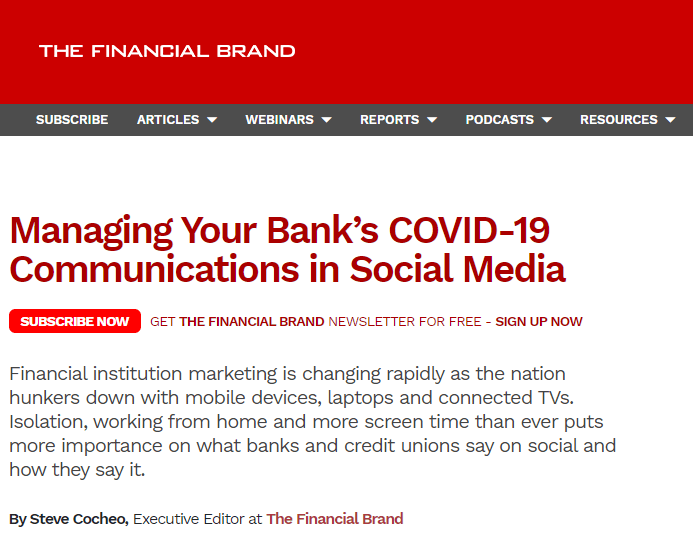
Financial institution marketing is changing rapidly as the nation hunkers down with mobile devices, laptops and connected TVs. Isolation, working from home and more screen time than ever puts more importance on what banks and credit unions say on social and how they say it.
Something that can be reassuring to both consumers and businesses is a demonstration that “we’ve got your back.”
“Banking institutions need to better communicate strength in uncertainty,” says Davia Temin, President and CEO of Temin and Company, a crisis management consultancy. “My suggestion is to channel Elizabeth Warren and ‘have a plan for that.’ Institutions might do well to showcase how much contingency planning they have done and how thorough it is. If the populace, the markets and the regulators believe them, life can be far less panic-driven.” […read more]
Sexual Harassment Reports in Steep Decline After #MeToo Peak
Jeff Green, Bloomberg, June 17, 2019
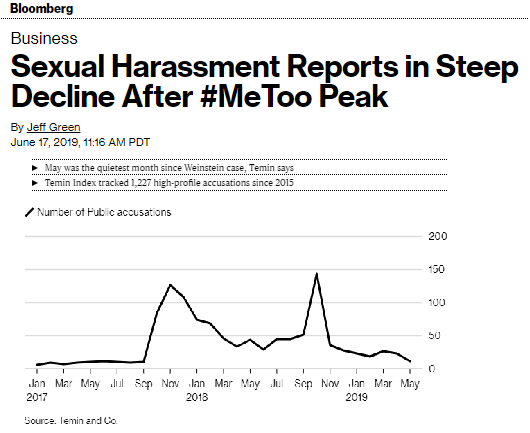
Public accusations of corporate misbehavior and harassment have fallen to their lowest level since October 2017, when allegations against movie producer Harvey Weinstein sparked the #MeToo movement.
Twelve complaints generated media coverage in May compared with a peak of 143 last October, according to data compiled by crisis consultant Temin and Co.
There are lots of reasons the pace of allegations has slowed, said Davia Temin. The initial outpouring included decades worth of historical revelations, clearing a kind of backlog. The news cycle has also moved on, and companies have gotten more sophisticated in the way they manage both bad behavior and negative PR. […read more]
‘A new era’: Trump and 2020 hopefuls are singling out more American companies by name
Jena McGregor, The Washington Post, June 13, 2019
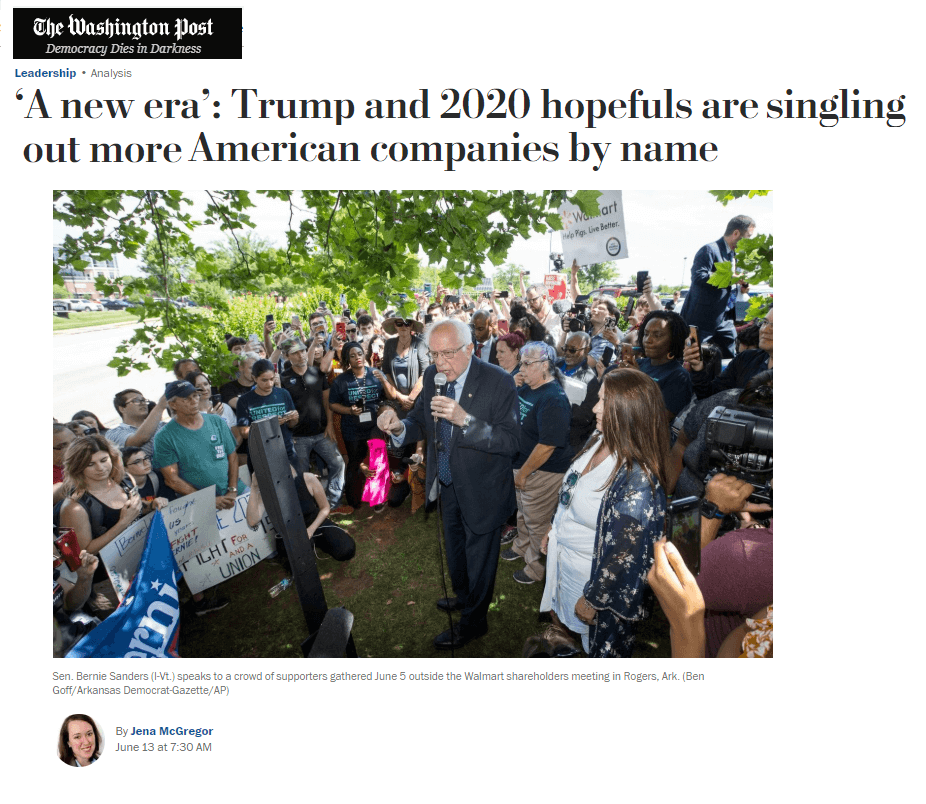
On Monday, after Raytheon and United Technologies announced merger plans, President Trump weighed in again with an opinion about American corporate business decisions, telling CNBC he was “a little concerned” the defense contractor and industrial technology giant’s merger could result in less competition if they become “one big fat beautiful company.” It was the latest in a long string of examples of Trump — whether by tweet or by tirade — singling out American companies.
But the president has been joined more often in recent months by 2020 Democratic presidential candidates who are also increasingly calling out companies by name, directly challenging American businesses in a way that historians and communication experts say underscores a new era.
Communications experts advised companies not to get into Twitter wars, to be responsive but not respond in kind, and to prioritize connecting with White House or legislative staffers early on when making announcements that could come under fire. In most cases, companies should use the opportunity to explain their story or strategy again rather than fight.
“Don’t escalate, don’t shoot back,” said Davia Temin, a communications and management coach on reputation issues. “The last thing an awful lot of people want is a one-upmanship match between the president or presidential candidates and an individual company.” […read more]
Marketing Lessons From Chase Bank’s Twitter Blowup
Bill Streeter, The Financial Brand, May 9, 2019
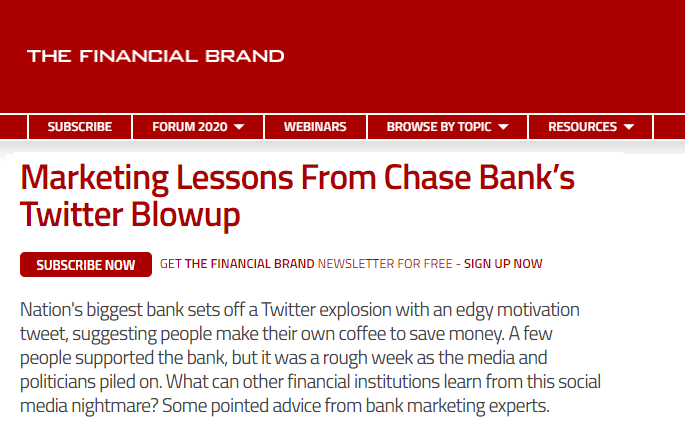
Nation’s biggest bank sets off a Twitter explosion with an edgy motivation tweet, suggesting people make their own coffee to save money. A few people supported the bank, but it was a rough week as the media and politicians piled on. What can other financial institutions learn from this social media nightmare? Some pointed advice from bank marketing experts.
Reputation and crisis-management consultant Davia Temin put it a little more bluntly in response to questions from The Financial Brand: “This was a case of a big bank being targeted and used to make a political point. Politicians pounced on a Chase marketing tweet that was a little Millennial, but essentially harmless.”
“I think the tone for financial institutions — and all of us — needs to be inspirational, aspirational, kind and witty. It’s the best way, and also much harder to attack. I might have suggested a Twitter response that was both light and serious, like this: ‘We clearly must not have had our morning coffee today — we are so sorry, and never meant to offend anyone with our morning tweet. Our goal was only to help suggest ways we can all save on the small things in order to reach big dreams’.” […read more]
Between Cosby and Kavanaugh — 810 High-Profile Public Figures Accused of Sexual Harassment
T&C Press Release, PR Newswire, October 3, 2018
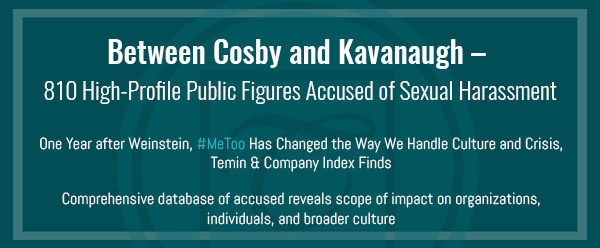
NEW YORK, Oct. 3, 2018 /PRNewswire/ — As the #MeToo movement has redefined “acceptable” conduct in every sphere of society — from the workplace to the university, from Hollywood to the Supreme Court — reputation and crisis management consultancy Temin and Company has logged 810 high-profile figures from Cosby to Kavanaugh accused of sexual harassment. This creates a comprehensive database of those accused of #MeToo-related conduct since the arrest of Bill Cosby in December 2015.
Among the 810 Temin’s “#MeToo Index” has tallied are: 234 in arts and entertainment; 192 in politics and government; 159 in business; 114 in media and broadcasting; and 63 in colleges and universities. “Every sector has been affected,” says Temin CEO Davia Temin, “and leaders — CEOs and board directors – are looking for insight on why, why now, and how we can address the reputational risk of toxic workplace cultures.”
Weinstein was the Watershed
“We are at a pivotal moment when several aspects of the movement, and its pushback, are converging,” Temin continues. “As the nation is fixated on the Kavanaugh hearings and FBI investigation, as well as Cosby’s sentencing as a ‘sexually violent predator,’ October 5 also marks one year since the explosive revelations of Harvey Weinstein’s decades of sexual misconduct. Our data tells us that these revelations opened the floodgates and set off the spike in allegations around the world.” Accusations averaged 6 per month between Cosby and Weinstein, and jumped to 78 in October 2017, 119 in November, and 103 in December. The average in 2018 is 42 per month. “We are seeing the public impact of these accusations in real time, and the power they have to marshal public sentiment, outcry, and action.”
No One Wants to be a “#MeToo Company”
As allegations around sexual misconduct and toxic culture increasingly dominate the news cycle, the consequences for organizations have risen exponentially. An SEC filing by CBS on September 28 revealed CBS has received subpoenas from the New York County District Attorney and the NYC Commission on Human Rights, as well as a request for information from the NYS Attorney General’s Office regarding allegations against Les Moonves, “CBS News and cultural issues at all levels of CBS.” “A dramatic shift is occurring in organizations everywhere, and corporate boards – especially women board members — are paying serious attention,” says Temin. “No one wants to be a ‘#MeToo company’ today.”
Metrics Bolster Narrative
“Personal narrative, fueled by social media, has transformed the #MeToo movement into a powerhouse very quickly,” Temin says. “But I believe it takes narrative combined with metrics — with research — to put the issue in context and fuel its next wave. One person’s story on social media, even anonymous, strikes a chord with others who have experienced the same thing, sometimes perpetrated by the same individual. Victims may have felt alone before, but then recognize that they have been part of a pattern. They then post their stories, sometimes anonymously as well. Their stories attract others who do affix their names, and a powerful trajectory of truth is begun.
“But you can lie with narrative as well. We all know that. It is the wise combination of metrics, personal narrative, and pristine due process that will bring us closest to long-hidden truths that have damaged women’s progress forever. That is why I started this Index.”
#MeToo Index: Highlights
Compiling data of allegations around sexual harassment, sexual assault, rape, workplace misconduct, and other related behavior, the continuously updated Temin #MeToo Index defines “high-profile” accusations as receiving at least seven mentions in the popular media. The database includes over 25 information fields, ranging from the accused’s age, industry, date of accusation and resolution, to political party. Highlights from the Index include:
- A steep explosion in numbers of public accusations occurred after Weinstein revelations in the New York Times – October 5, 2017:
- June, 2017: 10
- July, 2017: 10
- August, 2017: 9
- September, 2017: 11
- October, 2017: 78
- November, 2017: 119
- December, 2017: 103
- After the spike in accusations following Weinstein, the number of accusations per month has held relatively steady over the last 6 months:
- April, 2018: 28
- May, 2018: 39
- June, 2018: 24
- July, 2018: 39
- August, 2018: 41
- September, 2018: 35
- Entertainment, politics, and business draw most accusations:
- Arts & Entertainment: 234
- Politics & Government: 192
- Business: 159 (including 40+ in finance)
- Media & Broadcasting: 114
- Colleges & Universities: 63
- Final resolutions of cases (many still pending) include:
- 75 Arrested (Some before or after being fired)
- 18 Deceased (3 committed suicide)
- 146 Fired
- 211 Resigned
- 18 Retired
- 53 Suspended/Are on Leave
- 104 Lost Work (including entertainers or sports figures)/Other
- 221 No Repercussions
- 56 CEOs are the subject of accusations to date. 21 CEOs of public companies and 29 CEOs of private companies have had accusations revealed in the media, in addition to 6 nonprofit CEOs. In the nonprofit sphere, there are also 20 CEO-equivalents, including directors, founders, and presidents of prominent, heavily-funded national and international organizations, who have come under fire, with all 20 leaving their positions, although one was re-elected after being exonerated of the charges.
- Accusations of sexual misconduct cross party lines fairly evenly. For those in political office accused of misconduct, the split is fairly even between Democrats and Republicans: 76 Democrats vs. 70 Republicans.
- 97% of accused are male. Asia Argento captured media attention by being on both sides of the #MeToo debate – accuser and accused – but 787 of the 810 alleged perpetrators of sexual harassment or assault on the Temin #MeToo Index are male.
- The time between accusation to resolution has been growing shorter. As #MeToo begins to be seen as a real reputational risk, organizations are paying attention to and acting on complaints more quickly. Some are even announcing the resolution of a complaint at the same time they announce the accusation.
And, separately, in the business sphere:
- M&A deal risk: Financial impact in the M&A space came with the arrival of the “Weinstein clause” in mid-summer ’18, mandating additional due diligence of executive conduct in target companies and allowing acquiring firms to pull out if they found something they didn’t like.
- Asset management flight: Investors are seeing firms with sexual harassment complaints as an investment risk; some portfolio managers are staying away and others are questioning company management about their workplace culture issues and how they are dealing with sexual misconduct.
- Corporate investigations into company culture: “The best organizations are conducting deep dives into their corporate culture to better understand how sexual harassment is tolerated, and the dynamics at play in their workplace. Boards themselves are also more involved in addressing cultural insufficiencies in their companies than ever before – a role that used to belong almost exclusively to management and HR.”
“We are at the tip of the iceberg as more and more organizations continue or begin investigations into their cultures in general and #MeToo incidents in specific,” says Temin. “More incidents will come to light. Different sectors are reacting on different timelines, and with different levels of seriousness, but this is a movement toward fairness and safety that will not be stopped. It is inexorable.
“Organizations seeking to create cultures not only of safety, compliance and security, but of mentorship, innovation, purpose, and excellence, are demanding zero tolerance for this kind of misconduct and are demonstrating greater willingness to mete out consequences when required.”
The troubling case of Asia Argento, Jimmy Bennett and the #MeToo movement
Richard Winton, Los Angeles Times, August 23, 2018
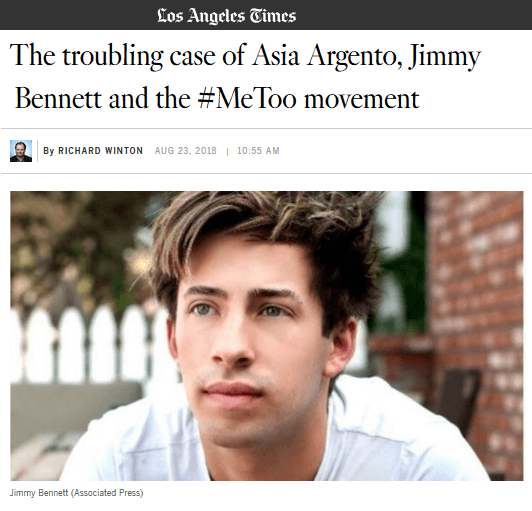
The Los Angeles County Sheriff’s Department is in the early stages of an investigation into allegations that actress Asia Argento sexually abused child actor Jimmy Bennett at a Marina del Rey hotel in 2013. But like so many sexual abuse allegations in Hollywood over the last year, this case is playing out in the media and the court of public opinion.
Law enforcement authorities from Los Angeles to London have investigated dozens of allegations against Hollywood figures including Harvey Weinstein, Kevin Spacey and others. The Argento case, however, is unique because she was one of the leading figures calling out others in Hollywood for alleged wrongdoing.
“It’s a man-bites-dog story, and it’s an anomaly in a serious and profound movement forward,” said Davia Temin, a crisis manager who does research on the #MeToo movement. “It shows that the story gets more complicated.” […read more]
The big picture: #MeToo has exposed hundreds of high-profile people
Haley Britzky, Axios, July 7, 2018
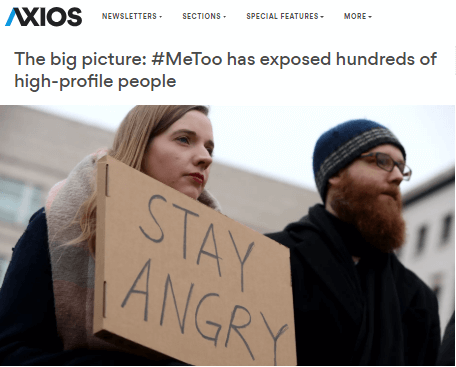
More than 400 high-profile executives and employees from across the professional spectrum have been brought down by the #MeToo movement in the last 18 months, Bloomberg reports.
The big picture: While #MeToo isn’t dominating headlines the way it was last year, the movement has still been at work behind the scenes. Davia Temin, whose firm Temin & Co. conducted the study cited by Bloomberg, said that while the accusation rate “has been slowing … the percentage of people being fired has increased.” […read more]
Hundreds of Business Leaders Face Accusations in #MeToo Movement
NACD Weekend Reader, June 30, 2018

A new reports finds the #MeToo movement over the last 18 months has opened the door to allegations against 417 high-profile employees and corporate executives, Bloomberg reports. The majority of those individuals are business leaders and executives—410 of them are men—from a wide array of industries, according to the report by crisis consulting firm Temin & Co.
Many of the allegations stem from incidents that happened years ago, but have only recently come to light. And while the rate of accusations has slowed recently, the percentage of individuals fired has increased.
“It started to become a tsunami, certainly after [Harvey] Weinstein, and it sparked other stories in the same industry and then across all industries,” said Davia Temin, president and CEO of Temin & Co. “I think it’s settled into a new plateau, but it is certainly higher than we’ve ever had before.”
Of the 417 high-profile individuals who were accused of issues related to sexual harassment, racial insensitivity, or other misconduct, 193 were fired, and 122 were either suspended, put on leave, or are having their actions investigated. […read more]
More News Articles



